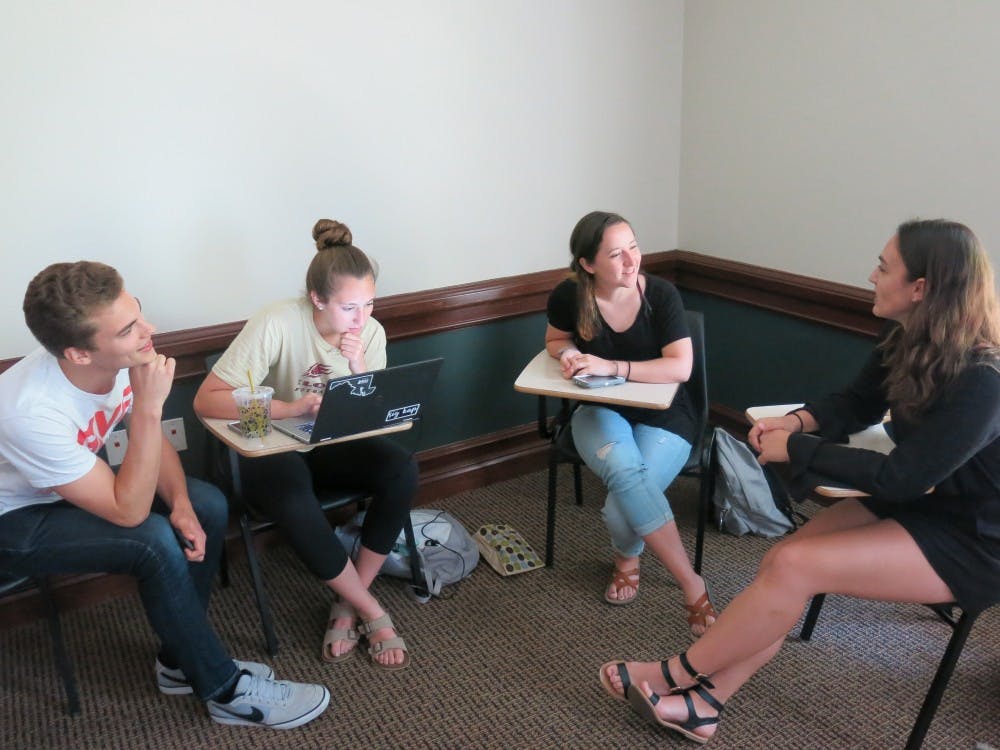When students return to Elon University in the fall, there will be a new way to find a ride to Harris Teeter. The Better Alamance Timebank — a way for students and community members alike to acquire hours that act as currency through service — will officially launch May 9.
The timebank is the product of a long-term project by the Honors seminar called “Building Better Communities with Civic Technologies.”
“The timebank is an alternative form of currency that uses time exchange instead of money,” said sophomore Lindsey Jordan, director of the project’s community outreach team. “It doesn’t matter what the scale is — somebody’s hours spent teaching a yoga class is equivalent to somebody’s hour babysitting or somebody’s hour driving or anything like that. It places more value on any work that people do.”
The concept of timebanking has been around for decades, according to Derek Lackaff, associate professor of communications. Lackaff, who proposed the class as a sophomore spring seminar for the Honors Fellows cohort, said the creation of digital platforms for managing timebanks has “changed the game.”
An hour is always an hour — regardless of the service offered. You can use the credits in turn to receive services — or you can donate them to others.
“Before digital, you basically had a club of people that already knew each other,” he said. “And with these digital platforms, you can actually find people that you might not already know, so they allow for these more diverse types of interaction.”
Lackaff said that timebanks are a perfect way to participate in the growing “sharing economy” in the United States, which includes things such as Uber and Airbnb.
“A timebank is actually a real sharing economy because it’s not a company that’s extracting profits out of all these interactions, it’s a group of people that come together and are volunteering their time and volunteering their efforts to help each other out,” he said.
Lackaff said a project was built into the class curriculum, but the students ultimately decided they wanted to work together on a larger initiative such as the timebank. The class formed three teams — community outreach, strategic planning and technology — to divide responsibilities.
“Over the course of several weeks, we looked at several different types of platforms and types of projects that we thought might be feasible for this type of project,” he said. “The timebank was kind of what emerged as the most likely candidate. It’s been a focus of the class since about Spring Break, more or less.”
The class decided on a platform called hourworld.org, which allows community members to sign up online, where they can log hours, request services and offer their own skills to the other members.
“We’ve been starting to do exchanges on the timebank just within our class to get it up and running, and now we actually have some community members that have signed up and made accounts as well,” said sophomore Hope Koene, the class’s project manager. “I think we have 19 or 18 members, which is really cool for us to see that it’s actually spreading to the community already.”
Despite the official launch not being until right before finals, the class isn’t concerned about its long-term prospects. According to Jordan, conversations about sustainability have been a part of the process. They have discussed several options, including Lackaff’s continued management, monthly member meetings over the summer or passing the timebank off to another organization.
The class hopes to work with Elon organizations that may already have connections throughout the community to spread the world about the Better Alamance Timebank.
“Our hope is [the timebank] really is open to everybody in Alamance, both Elon students and community members,” Jordan said.
The launch event will take place May 9 from 7-9 p.m. at the Elon Community Church. You can join by going to hourworld.org and selecting “NC-Elon: Better Alamance Timebank” from the list of communities.


